Seguimiento de los programas de transferencias monetarias
Los firmantes del Gran Pacto se comprometieron a aumentar el uso de los PTM y a utilizar marcadores comunes para medir estos incrementos. Aunque el seguimiento del volumen de los PTM está comenzando a realizarse de manera más efectiva, todavía persisten los desafíos técnicos y políticos. Estos incluyen:
- Definir qué datos se desea recolectar y cómo recolectarlos;
- Garantizar el compromiso y el uso de las categorías de datos y sistemas;
- Abordar las deficiencias de los sistemas de notificación existentes que no han sido diseñados para incluir o desagregar, dinero en efectivo, cupones y otras modalidades;
- Llegar a un acuerdo común sobre las categorías estándar para la presentación de informes a fin de evitar datos incompletos e incoherentes.
Prioridades actuales
Desde 2017 a 2019, la CALP Network colideró el Subgrupo de trabajo de asistencia en efectivo del Gran Pacto sobre el seguimiento de los PTM junto a la Dirección General de Ayuda Humanitaria y Protección Civil de la Comisión Europea (DG ECHO, por sus siglas en inglés), con el principal objetivo de acordar los requisitos mínimos para el seguimiento de los PTM. Esto incluye la integración de los PTM en los sistemas y plataformas de información interinstitucional clave, a saber, el Servicio de Seguimiento Financiero (FTS, por sus siglas en inglés) y el módulo de proyectos HPC de la Oficina de Coordinación de Asuntos Humanitarios (OCHA, por sus siglas en inglés), el Estándar de Datos de la Iniciativa Internacional para la Transparencia de la Ayuda (IATI, por sus siglas en inglés), y los informes de 3W (quién hace qué, dónde). El subgrupo de trabajo sobre seguimiento de los PTM ha sido fusionado en el subgrupo de trabajo de eficiencia, eficacia y relación costo-beneficio, que la CALP Network seguirá coliderando.
Contenido destacado

Tracking Cash & Voucher Assistance Workshop – Part 2: Report
Presentation
Do you want to read the latest on discussions on how to best track cash and voucher assistance in global interagency reporting systems? The CALP Network and ECHO have just released Tracking Cash & Voucher Assistance Workshop – Part 2: Report. Key recommendations emerging from the workshop are summarized below. These will be used in the coming months as a basis to develop guidance for...

Measuring Cash Transfer Programming – Scoping study
Report
This scoping study explores technical and policy issues that are constraining progress towards better measurement and reporting of Cash Transfer Programming (CTP) and addresses these to identify ways forward. The study was developed with the following objectives: • Map and document how different implementing agencies and donors are measuring cash and voucher programming data at the...

Tracking Cash and Voucher Assistance: Agreements, recommendations and minimum requirements from the Grand Bargain cash workstream
Guidelines and Tools
This document comprises the key outputs of the work undertaken through the Tracking Cash and Voucher Assistance (CVA) Working Group from 2017 to 2019. The Tracking CVA Working Group was established as the
platform for engagement and decision-making for the sub-workstream on Tracking CVA, which is part of the Grand Bargain Cash Workstream. The Tracking CVA sub-workstream was co-led by the the...
Líder temática
Últimos recursos

“No-one has ever helped me like this.” User journeys of cash recipients in Ukraine
Case Study
Russia‘s full-scale invasion of Ukraine in February 2022 has caused a severe
humanitarian crisis – with widespread displacement, destruction of infrastructure, and
an urgent need for humanitarian assistance. In response, the humanitarian community
has supported the Ukrainian government to initiate...
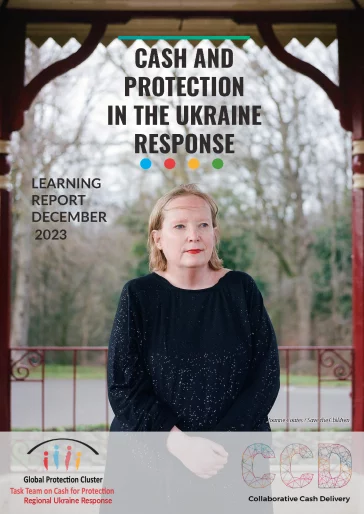
Cash and Protection in the Ukraine Response
Report
This learning report stems from bilateral discussions with the Collaborative Cash Delivery (CCD) Network’s members in Ukraine and Poland, many of whom were on the cusp of designing or implementing C4P programmes as part of the Ukraine response and were seeking learning and experience from each other.

WVI Cash Roadmap 2.0 – New Avenues – Leveraging, multiplying “Nexus” cash to take children and their families further than imagined
Policy paper
WVI's strategic global Cash Roadmap 2.0 (2024-2027) speaks to the organisations' commitment that amidst polycrises and resourcing constraints, there is urgency to maximise and multiply World Vision's capabilities, assets and cash voucher programming (CVP=CVA) is a powerful tool to do so.
Increasing...
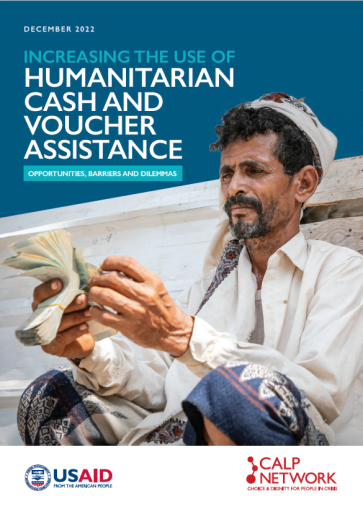
Increasing the Use of Humanitarian Cash and Voucher Assistance: Opportunities, Barriers and Dilemmas
Report
Through in-depth analysis of the latest data and careful modelling this study maps the current scale of CVA, and unpacks the opportunities and challenges involved towards it fully reaching its potential.
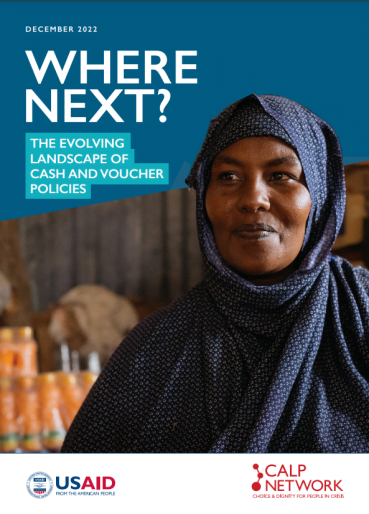
Where Next? The Evolving Landscape of Cash and Voucher Policies
Report
An exploration of how early policy commitments impacted the evolution of CVA, and what the CVA policy landscape looks like now.
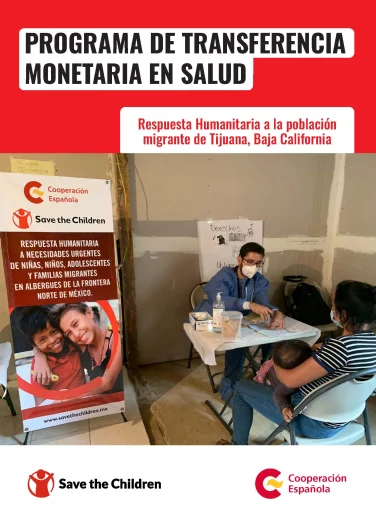
Programa de transferencia monetaria en salud: Respuesta Humanitaria a la población migrante de Tijuana, Baja California
Case Study
Es un documento que describe cómo se implementó Cash-Salud con población de movilidad en la frontera norte de México en Tijuana, Baja California, en un contexto del COVID-19 y de la aplicación de la norma título 42 de los Estados Unidos. El proyecto se ejecutó del 2021 a 2022, apoyado por AECID. El...
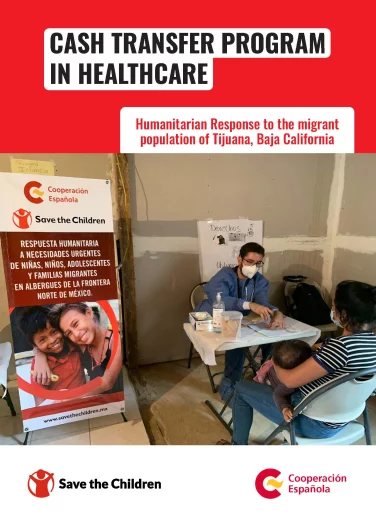
CASH TRANSFER PROGRAM IN HEALTH CARE: Humanitarian Response to the Migrant Population of Tijuana, Baja California
Case Study
In this report we summarize the execution of the first
Health Cash Transfer Program (CTP) implemented by
Save the Children Mexico and Spain; also, the first in the
Humanitarian Response area, to offer psychological care
to people in mobility situations. An additional innovation
of this program is that the...
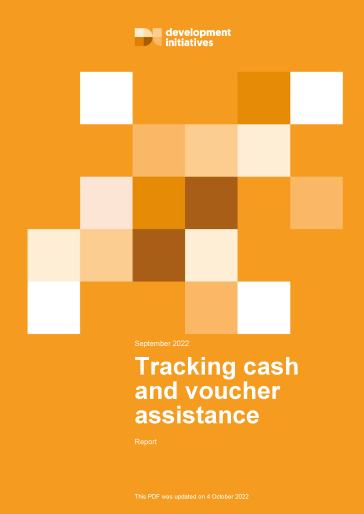
Tracking cash and voucher assistance
Report
(CVA) is seen as a success story of the Grand Bargain. Progress has also been made through the Grand Bargain 2.0 in endorsing a new cash coordination model. However, the most recent independent Grand Bargain monitoring report pointed out that the ‘tracking of the funding for CVA is still not optimal’....
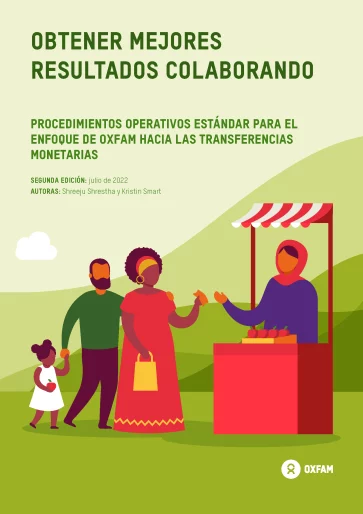
Obtener mejores resultados colaborando: Procedimientos operativos estándar para el enfoque de Oxfam hacia las transferencias monetarias
Guía y herramientas
“Obtener mejores resultados colaborando: Procedimientos operativos estándar para el enfoque de Oxfam hacia las transferencias monetarias” es una guía digital sobre todo lo relacionado con los programas de transferencias monetarias (PTM) en Oxfam, que se puede descargar y consultar en un teléfono,...
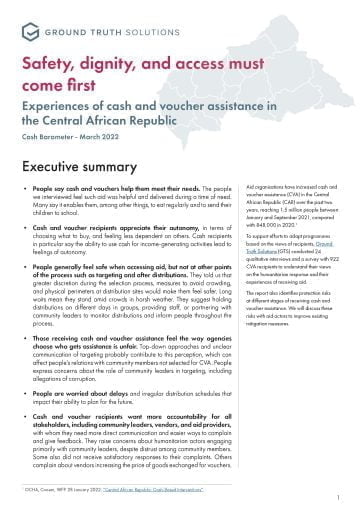
Safety, Dignity, and Access Must Come First: Experiences of Cash and Voucher Assistance in the Central African Republic
Report
Aid organisations have increased cash and voucher assistance (CVA) in the Central African Republic (CAR) over the past two years, reaching 1.5 million people between January and September 2021, compared with 848,000 in 2020. To support efforts to adapt programmes based on the views of recipients, Ground...

Financial Services In The Uganda Refugee Response – An Assessment Of Users’ Perspectives
Report
This assessment of user experiences and perspectives on digital financial services and assistance mechanisms aims to inform actors in Uganda’s humanitarian response and other stakeholders. The data collected is representative at the settlement level for refugees and at district level for refugee hosting...

Uganda Refugee Response Cash And Voucher Assistance (CVA) User Perspectives – Research Brief
Report
This brief presents the summarised findings of the study on Financial Services and Humanitarian Mechanisms in the Uganda Refugee Response: An Assessment of User Perspectives in Uganda.
The assessment intends to inform actors and key stakeholders in Uganda’s refugee response about peoples’ existing...
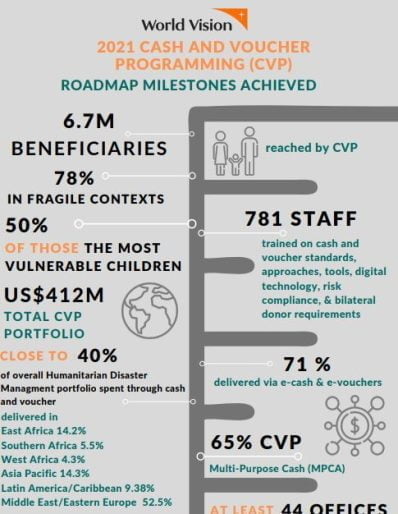
2021 Cash And Voucher Programming (CVP) Roadmap Milestones Achieved
Report
Summary Report of World Vision’s global progress report and milestones (against WV’s global Cash Roadmap Strategy) in Cash Voucher Assistance (Cash Voucher Programming-CVP) facilitated by World Vision in over 44 countries, reaching more than 6.7 Mio vulnerable people (78 % in Fragile Contexts) in...

Building Cash Products Through Human Centered Design
Report
The complexity of disaster response projects makes it hard for developers to understand how to develop effective digital tools that meet the needs of the users. Human Centered Design is a design and management framework that develops solutions to problems by involving the human perspective in all steps of...
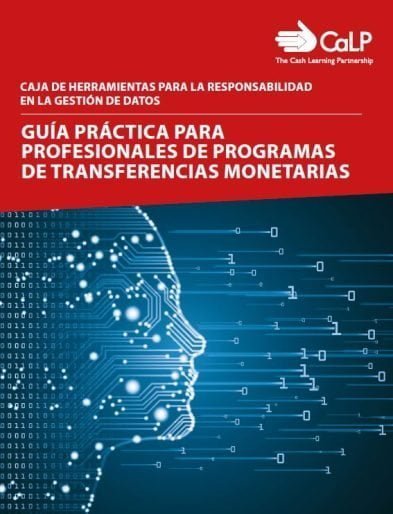
Guía Práctica Para Profesionales de Programas de Transferencias Monetarias
Informe
Esta guía actualizada se basa en el Data Starter Kit, elaborado por ELAN en 2016 y utilizado de manera generalizada. Este kit es uno de los primeros recursos desarrollados para ofrecer orientación en materia de seguridad y privacidad de los datos en el marco de la acción humanitaria. La guía se...
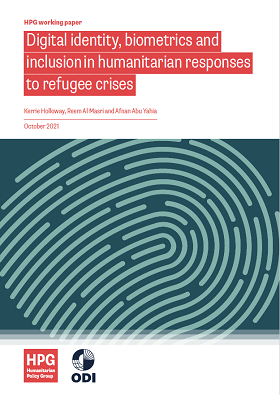
Digital identity, biometrics and inclusion in humanitarian responses to refugee crises
Report
Digital identity and biometrics have long been divisive topics in the humanitarian sector. On the one hand, they have the potential to be more inclusive and reach people in need at scale due to perceived efficiency gains. A legal identity for everyone as part of the Sustainable Development Goals (SDGs)...
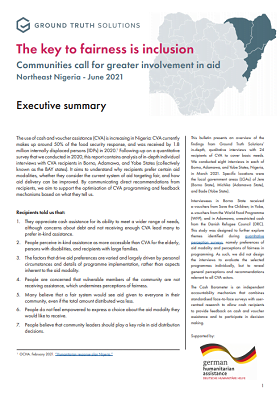
The Key to Fairness is Inclusion: Understanding Perceptions of Fairness and Aid Modality Preferences in Northeast Nigeria
Report
The use of cash and voucher assistance (CVA) is increasing in Nigeria: CVA currently makes up around 50% of the food security response, and was received by 1.8 million internally displaced persons (IDPs) in 2020. Following-up on a quantitative survey that we conducted in 2020, this report contains...

Global CWG Terms of Reference – 2021
Guidelines and Tools
The Global Cash Working Group (GCWG) (formerly the Geneva-based Cash Working Group (GbCWG)) was initially formed by practitioners in 2013 and led by ICRC and the CALP Network. In order to reflect a more inclusive and representative leadership arrangement and recognising the workload considerations from...
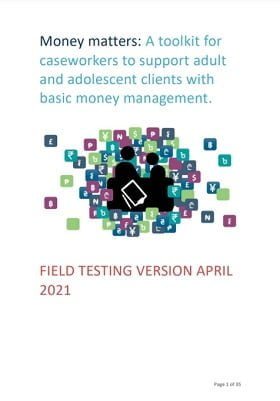
Money Matters: A toolkit for caseworkers to support adult and adolescent clients with basic money management
Guidelines and Tools
This tool is for use when child protection case management clients receive cash and voucher assistance as part of their child protection case management response. This tool sets out guidance for caseworkers that have previously had case management training. It will help caseworkers to support their...

2020 Cash and Voucher Programming (CVP): Roadmap and milestone achieved
Report
In 2020, World Vision has implemented cash and voucher programming like never before – not least due to the COVID-19 pandemic and related social protection transfer scale-ups. From 2019 to 2020, we have seen a 28 % increase of our cash, voucher based programming, moving towards enabling affected...



